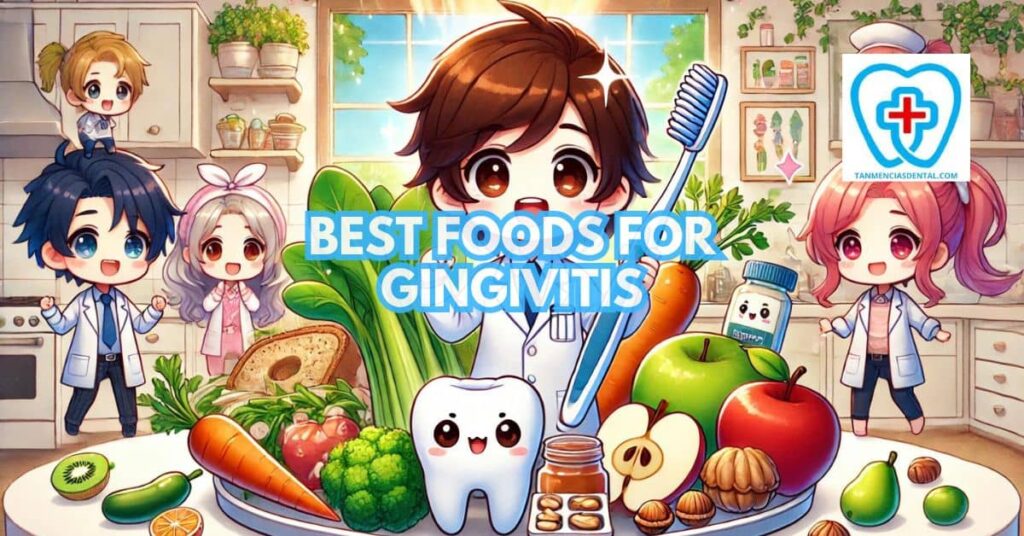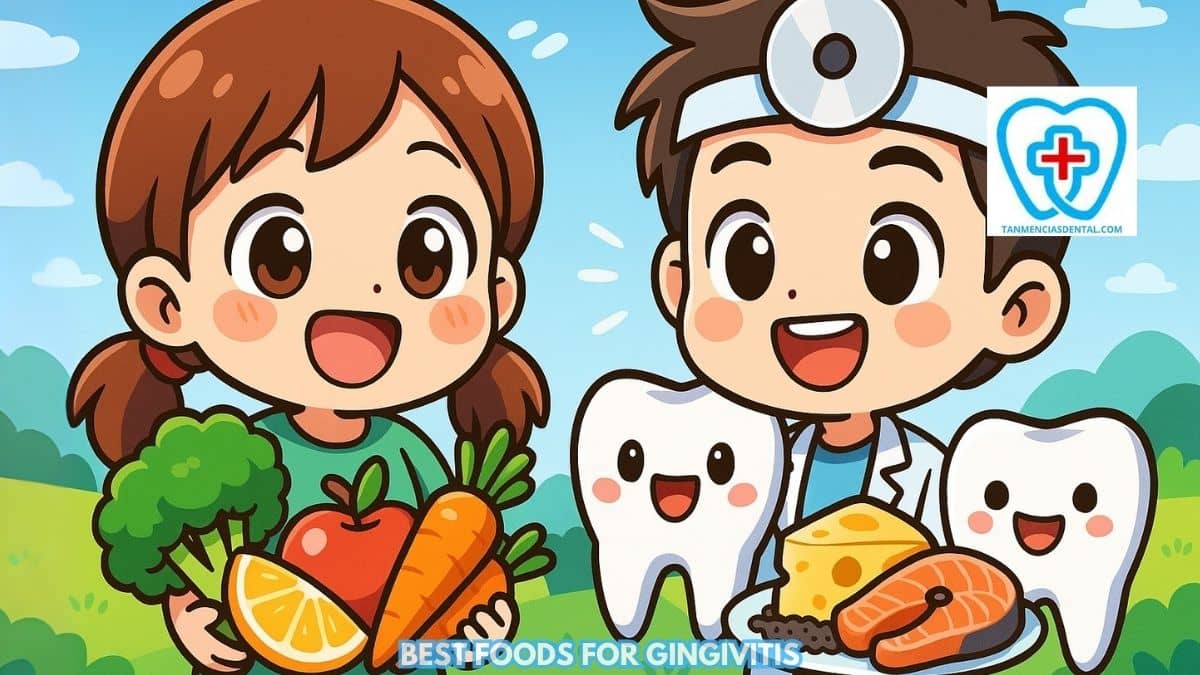Gingivitis is a mild but common gum disease that causes redness, swelling, and bleeding in the gums.
It usually develops when plaque builds up on teeth due to poor oral care.
If left untreated, gingivitis can become periodontitis, which is a more serious form of gum disease.
Research shows that certain foods can reduce inflammation, strengthen gum tissue, and support healing.
We’ll explore the best foods for gingivitis and explain how they can naturally protect your gums.
1. What is Gingivitis?
Gingivitis is an early stage of gum disease, marked by inflammation and bleeding of the gums.
It is caused by the accumulation of plaque, a sticky film of bacteria that forms on the teeth.
Common symptoms include swollen, red, and tender gums that may bleed during brushing or flossing.
If not addressed, gingivitis can advance to more severe gum diseases like periodontitis.
Understanding the causes and symptoms of gingivitis is crucial for effective prevention and treatment.
🦷 Do You Rinse Your Mouth After Brushing Your Teeth?
2. Nutrition’s Role in Gum Health
Proper nutrition plays an important part in keeping gums strong and reducing the risk of infection.
Nutrients from a balanced diet support gum tissue repair and help the body fight harmful bacteria in the mouth.
Eating a variety of fruits and vegetables gives the body vitamins like C and minerals that are needed for healthy gums.
Lean proteins, dairy, and whole grains also provide nutrients that protect teeth and support the immune system.
When the diet lacks these foods, the immune system becomes weaker, which can make the gums more likely to develop gingivitis or even progress to periodontal disease.
Poor nutrition may also slow healing in the gums, making treatment less effective.
Choosing nutrient-rich foods every day is a simple way to protect oral health and lower the risk of gum problems.
🦷 Is It Bad To Brush Your Teeth After Every Meal?
3. Omega-3s: Nature’s Anti-Inflammatory
Omega-3 fatty acids are known for their potent anti-inflammatory effects, which can benefit gum health.
Foods rich in omega-3s, like salmon, flaxseeds, and chia seeds, help reduce gum inflammation.
Studies have shown that omega-3s can lower the risk of periodontitis and improve overall gum health.
Including these foods in your diet can help manage gingivitis and prevent it from worsening.
Aim to consume omega-3-rich foods several times a week for the best results.
🦷 The Connection Between Drinking Alcohol and Gingivitis
4. Vitamin C: A Gum Tissue Guardian
Vitamin C is crucial for the repair and maintenance of gum tissue.
It helps in the production of collagen, a protein that keeps gums strong and resilient.
Citrus fruits, strawberries, bell peppers, and broccoli are excellent sources of vitamin C.
Regular intake of these foods can help prevent gum bleeding and reduce the risk of developing gingivitis.
Ensuring adequate vitamin C in your diet supports overall gum health and aids in the healing process.
🦷 Can Periodontal Gum Disease Be Reversed?

5. Calcium and Phosphorus: Building Blocks for Strong Gums
Calcium and phosphorus are important minerals that help keep teeth and gums healthy throughout life.
These nutrients work together to strengthen tooth enamel, which is the hard outer layer that protects teeth from damage.
Dairy foods like milk, cheese, and yogurt are rich in calcium, while nuts, seeds, and leafy greens also provide a good supply of both minerals.
When calcium and phosphorus levels are balanced, they support the jawbone and give stability to the teeth.
A strong jaw and healthy enamel reduce the risk of gum problems and lower the chance of tooth decay.
Without enough of these nutrients, teeth may become weaker and more likely to break down under the pressure of daily chewing.
Including calcium and phosphorus-rich foods in daily meals is an effective way to improve gum strength and overall oral health.
🦷 Basic Dental Care Vs Routine Dental Care: What’s the Difference?
6. Vitamin D and K2: A Powerful Team for Gum Strength
Vitamin D helps the body absorb calcium and supports the immune system, which is important for healthy gums.
Vitamin K2 makes sure that calcium goes to the teeth and bones instead of staying in soft tissues.
Together, these vitamins help keep the jawbone strong and the gums stable.
Foods like sardines, egg yolks, liver, mushrooms, and fortified milk are good sources of vitamin D.
Foods such as natto, brie, Gouda, and other aged cheeses provide vitamin K2 to support gum health.
🦷 Can Children Use Electric Toothbrushes? Is It Safe and Effective for Them?
7. Probiotics: Friendly Bacteria for Your Mouth
Probiotics are beneficial bacteria that help balance the microbial environment in your mouth.
Foods like yogurt, kefir, and fermented vegetables such as sauerkraut contain probiotics.
These friendly bacteria can inhibit the growth of harmful bacteria that cause gum disease.
Regular consumption of probiotic-rich foods can improve gum health and reduce the symptoms of gingivitis.
Incorporating probiotics into your diet is an effective way to maintain a healthy oral microbiome.
🦷 How to Treat Gingivitis in Toddlers: A Parent’s Guide
8. Antioxidant Boost: Shield Your Gums from Damage
Antioxidants play a significant role in protecting gum tissues from oxidative stress and damage.
Berries, green tea, nuts, and dark chocolate are high in antioxidants like vitamin E and polyphenols.
These compounds help neutralize free radicals that can harm gum tissues and lead to inflammation.
A diet rich in antioxidants supports healthy gums and can help prevent the progression of gum disease.
Eating a variety of antioxidant-rich foods daily can bolster your gum health and overall well-being.
🦷 How Sedation Dentist Procedures Help Patients Overcome Dental Anxiety
9. Stay Hydrated: Quench Your Thirst, Benefit Your Gums
Staying hydrated is essential for maintaining good oral health.
Water helps wash away food particles and bacteria, reducing the risk of plaque buildup on your teeth and gums.
It also stimulates saliva production, which naturally cleanses the mouth and helps prevent gum disease.
Drinking plenty of water throughout the day can keep your gums healthy and support overall oral hygiene.
Aim to drink at least eight glasses of water daily for optimal gum health.
🦷 How to Keep Your Teeth Clean With Braces: A Helpful Guide
10. Limit Sugary and Processed Foods: A Sweet Deal for Your Smile
Sugary and processed foods contribute significantly to plaque formation and gum disease.
Bacteria in the mouth feed on sugars, producing acids that can irritate and inflame the gums.
Reducing your intake of sweets, sodas, and processed snacks can significantly improve your gum health.
Instead, opt for whole, natural foods that support oral health.
By limiting these harmful foods, you can protect your gums and maintain a healthier smile.
🦷 Basic Dental Needs in Marikina
11. Don’t Forget Professional Care: Partner with Your Dentist
Regular dental checkups are crucial for preventing and managing gingivitis.
Your dentist can perform professional cleanings to remove plaque and tartar that cannot be eliminated by brushing and flossing alone.
They can also provide personalized advice on maintaining gum health and monitor for early signs of gum disease.
Consistent dental visits, combined with good oral hygiene and a healthy diet, form a comprehensive approach to fighting gingivitis.
Partnering with your dentist ensures that you receive the best care for your gums.
🦷 Expert Family Dentistry in Marikina
👨⚕️ Conclusion
Incorporating these foods into your diet can naturally fight gingivitis and promote gum health.
A balanced diet rich in essential vitamins and minerals, combined with proper hydration and regular dental visits, can help maintain healthy gums.
By making smart dietary choices and practicing good oral hygiene, you can effectively manage and prevent gum disease.
Take charge of your gum health today and enjoy a brighter, healthier smile.
Eating well is not just good for your body but also for your gums.
😊 Self-Promotion
Visit Tan-Mencias Dental Clinic in Parang, Marikina City, for all your dental care needs.
Our friendly and professional team is dedicated to providing top-notch dental services in a comfortable and welcoming environment.
For any questions or to schedule an appointment, you can call us at 9171451074, send a message through our Facebook page, or use our website’s contact form.
We’re here to help you achieve a healthy, beautiful smile.
We look forward to seeing you soon!
❔ FAQs
1. What foods should I avoid if I have gingivitis?
Sugary snacks, sodas, and processed foods should be limited because they feed bacteria that cause plaque.
Sticky foods that cling to teeth can also make gum problems worse.
Reducing these foods helps your gums heal and lowers the risk of further damage.
2. Can diet alone cure gingivitis?
A healthy diet can improve gum strength and reduce inflammation, but it is not enough by itself.
Good oral care, such as brushing, flossing, and regular dental visits, is still necessary.
Diet works best when combined with daily hygiene and professional care.
3. How long does it take for gums to improve with better food choices?
Results vary, but many people notice less bleeding and swelling in a few weeks after eating more nutrient-rich foods.
Consistency is important because gum health improves slowly over time.
Pairing diet with good oral care speeds up recovery.
4. Are supplements as effective as foods for gingivitis?
Supplements can help if you are low in certain nutrients, but whole foods usually give better results.
Foods provide a mix of vitamins, minerals, and other compounds that work together.
Whenever possible, get nutrients from natural sources first.
5. Can children also benefit from these foods for gingivitis?
Yes, children can also develop gingivitis, and nutrient-rich foods help keep their gums healthy.
Foods rich in vitamin C, calcium, and probiotics are safe and helpful.
Teaching healthy eating and oral habits early reduces the risk of gum disease later in life.

